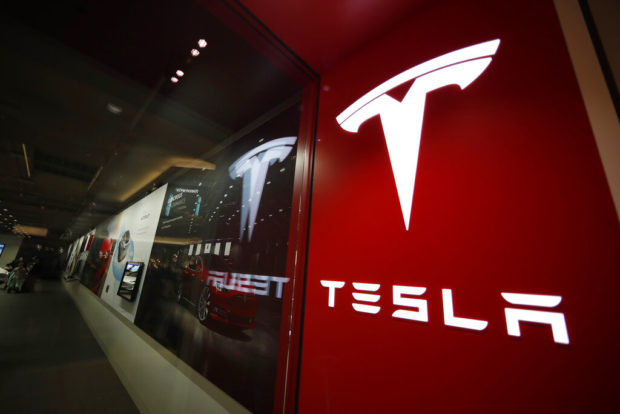
In this Feb. 9, 2019, file photo, a sign bearing the company logo is displayed outside a Tesla store in Cherry Creek Mall in Denver. AP
DETROIT — Tesla is walking back its plan to close most retail stores worldwide in a move the company says will force it to raise prices on most of its electric vehicles.
The company still will move to online-only sales, but now says it won’t close as many stores as originally thought.
Tesla announced last month that it would shutter most of its stores to cut costs so it could sell its lower-priced Model 3 for $35,000.
The $35,000 base Model 3 will still be available but the company will raise prices 3 percent on all other models.
In a Monday filing with government securities regulators, Tesla now says it closed 10 percent of its stores, but a few of those will now remain open. Another 20 percent are being evaluated and some could remain open.
The company gave no numbers, but said it would close only about half the stores that it had intended to. It has 378 stores and service centers worldwide and about 100 stores in the US.
“As a result of keeping significantly more stores open, Tesla will need to raise vehicle prices by about 3 percent on average worldwide,” a company’s statement said. “We will only close about half as many stores, but the cost savings are therefore only about half.”
Remaining stores could have fewer workers, but will have vehicles available for test drives and a small inventory in case people want to buy immediately, the statement said.
The company also announced Monday that it has purchased car-hauling trucks and trailers from a California company in a stock deal worth about $14.2 million. Tesla paid for the purchase with about 50,000 previously authorized shares. The move is designed to increase Tesla’s vehicle transportation capacity and cut delivery times.
The reversal shows that Tesla had second thoughts about shuttering the stores and whether buyers would make such a large purchase without a test drive. The company says it still plans to offer buyers the ability to return purchased vehicles at no cost after a seven-day or 1,000 mile test drive.
Gartner analyst Michael Ramsey called the move “startling” and said it undermines the credibility of Musk and Tesla’s management.
“How else can you view it except to see it as a remarkable example of lack of foresight or planning?” Ramsey asked. “It’s almost as if the decision was announced and made without any analysis of what the outcome would be.”
Musk probably realized that he was locked into long-term leases on the stores that he would have to pay regardless of whether they were closed, Ramsey said.
The move made no sense to begin with because Tesla had spent millions fighting in courts and state legislatures trying to change laws that prevented companies from selling vehicles at their own stores, Ramsey said.
But he also said the move to close 10 percent of stores and evaluate others is the right thing to do, and said most retail companies do that all of the time.
Messages were left Monday seeking comment from a Tesla spokesman. Shares of Tesla edged up less than 1 percent in trading early Monday.
In announcing the move on Feb. 28, CEO Elon Musk said it was necessary to cut costs in order to profitably sell the mass-market version of the Model 3 sedan for $35,000. That’s a price point needed to reach more consumers and generate the sales that the company needs to survive, Musk has said. Before the announcement, the cheapest Model 3 started at $42,900.
“This is the only way to achieve the savings for this car and be financially sustainable,” Musk told reporters during a conference call announcing the change. “It is excruciatingly difficult to make this car for $35,000 and be financially sustainable.”
On Feb. 28, the company said shifting totally to online sales would allow it to lower all vehicle prices by 6 percent, on average, including its higher-end Model S and Model X.
At the time, Musk also walked back the company’s guidance that it would be profitable in all future quarters, saying it would post a loss in the first quarter of this year.
All other major automakers rely on vast dealer networks, but Musk co-founded Tesla in 2003 in an effort to shake up the industry, starting with a focus entirely on a fleet of cars powered by electricity instead of gasoline. /ee